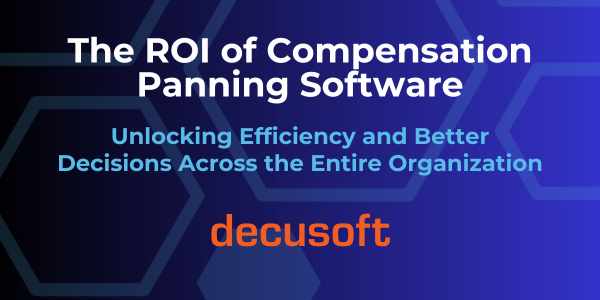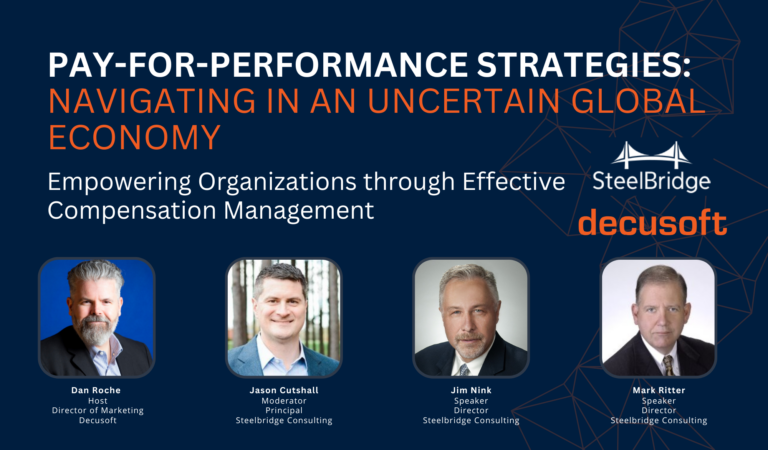Let’s be honest, money matters. It always has. Employees don’t work for the pure joy and satisfaction that comes from doing a good job — that’s a hobby — they work because they expect to be paid for their talents, their efforts, and their time.
But being productive and motivated at work takes more than money and getting that right can be tricky. Ensuring that employees have all that they need to be successful and fulfilled in their work requires businesses to take a hard look at the relationship between pay and other key aspects of employee engagement. In fact, it requires that businesses see “compensation” more broadly.
Compensation Excellence
Getting compensation right, for both the employee and the organization, is complex. So much so that it has become a specialty within many HR departments. These specialists’ study internal and external trends and build compensation packages that align, and even define, compensation excellence. Yet while there are common themes that can impact compensation management strategies, there’s never a one-size-fits-all solution.
It’s important to recognize that many workers are confused by, even skeptical of, compensation. Some employees have no idea if they’re being paid fairly. While many others are convinced that they are underpaid — a Robert Half survey found that 49% of employees believe they aren’t paid fairly, even if they’re at or above industry benchmarks.
Therefore, compensation management is a critical piece of a multi-faceted business strategy. It requires a long-term plan that’s agile enough to flex with the changing workforce. At the same time, it must be comprehensive and inclusive enough to attract and retain talent in one of the most competitive labor markets in history.
Making Compensation Work
Getting monetary compensation right is a significant way to attract new employees, as well as a meaningful motivation for current-employee performance, happiness, and retention. But following through is more complicated than you might think. Ultimately, job offers that aren’t competitive are non-starters. And low pay for current employees will often cause them to look for, and entertain, other opportunities. If employees believe they are underpaid, even if they remain in the job they will do so with less motivation and productivity, which isn’t good for anyone. Salary transparency is key. It not only promotes DEI, but it helps your organization attract only interested candidates making the recruiting and hiring process simple and easy.
But while having a compensation plan that’s encompasses salaries higher than a competitors’ can be a meaningful advantage, it can create issues with sustainability, return on investment, or meeting business goals. So, businesses need more.
Balancing Compensation with Needs
Employees know that pay is important, but it’s also insufficient — they want more from their employer than money. Robert Half confirmed what many HR professionals already know: money is not the complete solution for building employee satisfaction and loyalty. The truth is, how companies more broadly compensate employees is what makes a difference.
Employees are more likely to be engaged when their job provides clear communication, reasonable expectations, opportunity for growth, and a strong team culture. They want their work to be meaningful and fulfilling, and provide:
- A clear understanding of how their compensation is determined.
- Constructive performance feedback with clearly identified expectations.
- Meaningful development opportunities.
- An employer that is committed to its values, culture, and engagement strategies.
Managing compensation is broader for employees — it requires businesses to see everything that makes a job important on a personal, professional, and even a societal level.
Don’t Confuse Wages with Bonuses
When it comes to enhancing compensation with bonuses, cautions employers that using bonuses to attract and retain employees can be an effective short-term initiative but isn’t sustainable over the longer term. Lesli Jennings, WTW’s senior director of Talent Management and Organizational Alignment, said, “Sign-on, recruiting, and retention bonuses can help employers get the upper hand in the short term, but those initiatives are temporary. If employers are serious about hiring workers with critical skills and keeping their top talent, they need to implement sustainable programs and policies that will enhance a powerful employee experience, reimagine career opportunities, and flex to the needs of their increasingly diverse workforces. It’s an opportunity for a ‘great awakening’ on the employee experience.”
Jennings is right about that. Employment statistics reinforce the need for long-term compensation strategies. In July 2021, the Bureau of Labor Statistics cautioned that inflation would take a bite out of wage increases and represent a decrease in purchasing power for employees. and employees are sure to notice.
But the survey also served to clarify that businesses are recognizing what’s truly important to employees. In addition to increasing salary budgets, businesses are providing more workplace flexibility, excellent employee experiences, and increasing their focus on diversity, as well as equity and inclusion values and strategies.
That said, there’s another downside to a short-term focus on monetary compensation versus aligning it with other elements of an organization’s values, culture, and engagement strategy. ADP reports that most U.S. workers will get an average, and very enticing, 5.8% raise by changing jobs. So, if businesses see money as the only real measure of employee value, employers are going to need to pony up to keep up or face significant turnover.
The solution can be quite simple. A survey by Great Place to Work asked the question, “What is the most important thing that your manager or company currently does that would cause you to produce great work?” Tellingly, 37% of employees responded that they want personal recognition. Only 7% answered that they want more pay.
During record numbers of resignations and abysmally low numbers of candidates to choose from, it’s critical that businesses get compensation right. And that does not mean simply throwing more money at talent. It means seeing compensation planning more broadly and using it as a strategic employee benefit that aligns with the business’s DEI initiatives that encompasses its values, culture, and engagement beliefs and actions.




